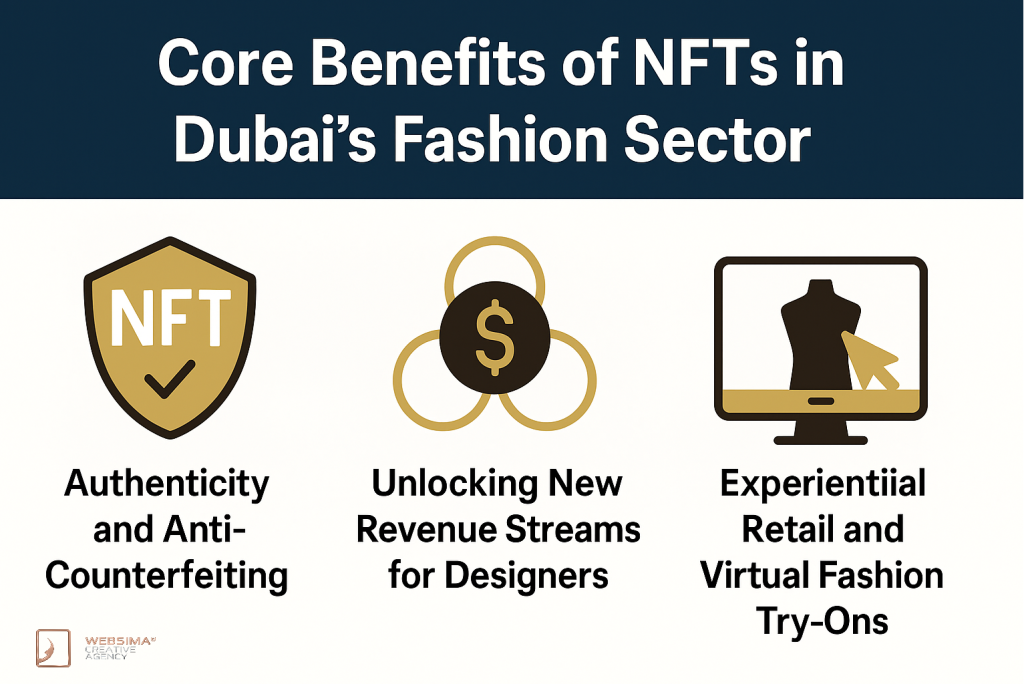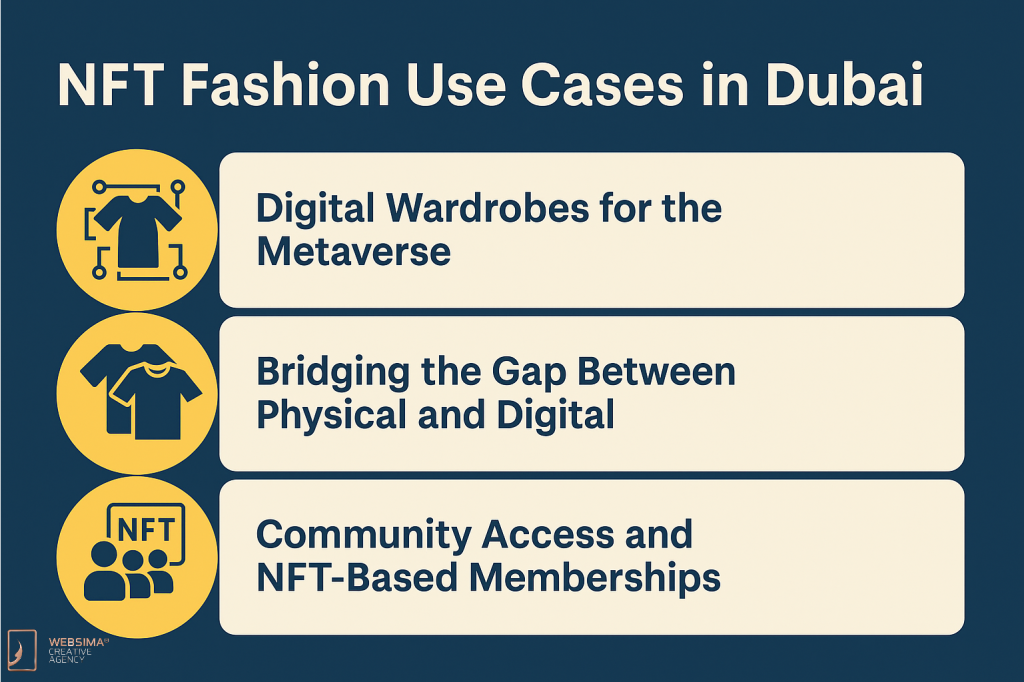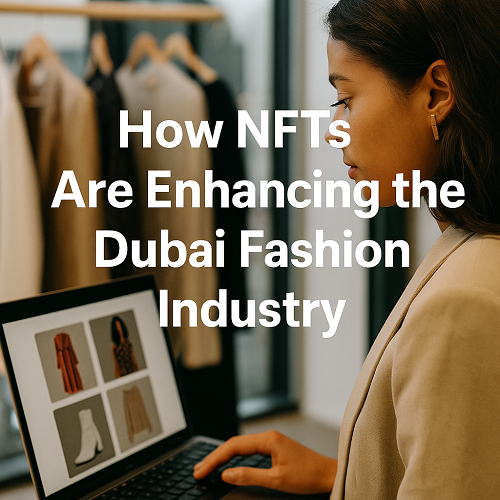Dubai has always been synonymous with luxury, innovation, and style. From its high-end malls to global fashion weeks and design hubs, the emirate continuously sets benchmarks in the global fashion scene. But today, a new wave is taking shape—where technology meets haute couture through the power of blockchain. The UAE’s role in global NFT market and Dubai as a hub is becoming significant by making big transformations. At the center of this transformation are non-fungible tokens (NFTs), reshaping the very essence of fashion ownership, creativity, and commerce in Dubai.
The convergence of NFTs and fashion is not just a trend—it represents a structural change. As Web3 becomes a core component of Dubai’s digital strategy, the fashion sector is emerging as a prime beneficiary. Designers, brands, and consumers alike are leveraging NFTs to redefine originality, exclusivity, and interactive experiences. The NFT fashion industry Dubai movement is accelerating fast, turning garments into digital assets and reimagining value far beyond the runway.
The Rise of Digital Fashion in Dubai
✨ Dolce&Gabbana and @UNXD_NFT have been busy building. Here’s some alpha.
Sneak peek at revamped visuals for the first DGFamily drop. Each DGFamily Box holder will receive at least 2 NFTs from this 20-look collection, each look paired with a linked wearable in @Decentraland. pic.twitter.com/ffqQz81bwR
— Dolce & Gabbana (@dolcegabbana) May 7, 2022
Dubai’s Commitment to Fashion Innovation
Dubai’s fashion ecosystem is backed by major events such as Arab Fashion Week, Dubai Design District (d3), and luxury labels investing heavily in digital experiences. The city is home to dozens of fashion-tech startups, from augmented reality fitting rooms to virtual catwalks. Adding blockchain and NFTs to this already dynamic mix makes Dubai one of the most forward-thinking fashion capitals globally.
The Role of the Metaverse and Virtual Fashion Shows
With the rise of metaverse platforms, Dubai-based designers are hosting virtual runway shows where attendees wear VR headsets and purchase NFT-linked outfits directly from the experience. Dubai’s metaverse development plans are ambitious; according to a recent report, the Dubai Metaverse Strategy aims to create 40,000 virtual jobs and add $4 billion to the city’s economy by 2030—transforming digital industries like fashion.
Core Benefits of NFTs in Dubai’s Fashion Sector

1. Authenticity and Anti-Counterfeiting
One of the most significant challenges in the fashion industry is verifying the authenticity of luxury goods. NFTs solve this by acting as a digital certificate of ownership stored on the blockchain. Each NFT tied to a garment or accessory proves its originality and history—empowering both brands and buyers.
High-end fashion houses in Dubai are embedding NFC chips linked to NFTs in their physical products. These chips allow buyers to scan and verify the garment’s metadata—brand, designer, edition number, and origin.
2. Unlocking New Revenue Streams for Designers
The NFT fashion industry Dubai movement gives creators more control over their designs and revenue. Through smart contracts, designers earn royalties every time an NFT is resold, ensuring perpetual income from their original work.
Additionally, emerging artists and fashion entrepreneurs in Dubai’s vibrant creator economy now have a platform to sell limited-edition digital outfits without the massive overhead costs associated with physical production.
3. Experiential Retail and Virtual Fashion Try-Ons
Augmented reality (AR) and NFTs are merging to create immersive retail experiences. In Dubai malls and concept stores, customers can try on digital fashion items using smart mirrors or AR apps. Once they make a purchase, they receive an NFT wearable version for use in the metaverse or social platforms like Snapchat and Instagram.
This digital-physical hybrid shopping model is fast becoming a signature retail approach across the emirate.
NFT Fashion Use Cases in Dubai

Digital Wardrobes for the Metaverse
Dubai’s NFT fashion designers are now creating fully virtual collections for avatars used in platforms like Decentraland, Roblox, and Meta Horizon Worlds. These collections often debut during metaverse fashion events and are tradable via marketplaces such as OpenSea or LooksRare.
Some digital garments are created as 1-of-1 NFTs, while others are released in exclusive batches to drive scarcity and value.
Bridging the Gap Between Physical and Digital
Brands like The Giving Movement and Amato Couture are exploring dual-releases—where each physical piece is accompanied by a digital twin in NFT format. Buyers receive both the tangible product and its blockchain-verified replica, which can be showcased online, used in virtual worlds, or traded as a collectible.
Community Access and NFT-Based Memberships
Fashion labels in Dubai are launching NFT-powered membership clubs, granting holders exclusive access to VIP events, previews, and limited-edition drops. These NFTs act like dynamic loyalty cards, evolving in value as the brand grows.
An example is FashionDAO Dubai, which tokenizes community voting rights, allowing supporters to decide on upcoming designs or collaborations—turning fans into stakeholders.
Fashion and Environmental Sustainability Through NFTs
The global fashion industry is one of the most polluting industries. NFTs present a greener alternative by promoting virtual garments and reducing overproduction. Dubai-based designers are increasingly participating in eco-friendly fashion through:
- Digital-only collections with zero waste
- NFTs verifying supply chain transparency and ethical sourcing
- Carbon-neutral minting processes on eco-focused blockchains like Polygon and Tezos
For instance, Tezos has gained popularity among eco-conscious creators for its energy-efficient Proof-of-Stake consensus mechanism and commitment to carbon neutrality.
Challenges to Scaling NFT Fashion in Dubai
Consumer Education and Onboarding
Despite Dubai’s tech-savviness, understanding blockchain wallets, NFT marketplaces in Dubai, and token utility can still be a barrier for traditional fashion consumers. Brands must focus on intuitive user interfaces, simplified wallet integration, and educational campaigns to onboard new users.
Volatility and Market Saturation
The NFT market is known for its price fluctuations and speculative behavior. Dubai-based fashion brands must differentiate themselves with utility-driven NFTs, meaningful community engagement, and sustainable business models—not just hype.
Regulatory Clarity and IP Protection
As with other blockchain innovations, NFTs raise questions around intellectual property (IP) rights. The UAE’s digital IP protections—outlined in WIPO’s country profile for the UAE—are increasingly relevant for ensuring creators’ rights are protected in both physical and digital domains.
What’s Next for NFT Fashion in Dubai?
By 2030, Dubai may become the global capital of NFT-powered fashion innovation. As the city continues investing in smart retail, blockchain regulation, and the metaverse, new applications will emerge, such as:
- Real-time customization of NFT outfits for live avatars
- NFT sneakers with embedded step-tracking data
- Designer marketplaces with AI-curated style matching
- Fashion NFTs redeemable for luxury experiences—spa days, hotel stays, or concerts
- AI-generated fashion drops governed by decentralized autonomous communities
Fashion houses may also leverage soulbound tokens (SBTs)—non-transferable NFTs that showcase a person’s fashion history, achievements, or style evolution, becoming a digital resume of one’s sartorial journey.
Conclusion
Dubai is leading the global fashion-tech revolution, with NFTs at the center of this disruption. The NFT fashion industry Dubai scene is no longer just about showcasing style—it’s about redefining ownership, creating immersive experiences, and unlocking digital-first economies for creators and consumers.
As designers tap into smart contracts, AR integrations, metaverse fashion shows, and Web3 retail strategies, the city is establishing itself as a magnet for fashion innovation. Dubai’s ecosystem—fueled by government support, blockchain infrastructure, and cultural openness—is uniquely positioned to make NFT fashion a mainstream movement.
Build the Future of NFT Fashion with Websima
At Websima, we help fashion brands, designers, and creators navigate the powerful intersection of fashion and Web3. Whether you’re looking to launch your first NFT wearable collection, integrate blockchain loyalty into your store, or create a metaverse-ready fashion house, our team is equipped to deliver full-cycle blockchain development with legal, technical, and strategic alignment.
We specialize in:
- Smart contract development for NFT fashion collections
- Marketplace integration and digital asset minting
- Cross-platform deployment for virtual fashion in Decentraland, Roblox, and other environments
- Eco-friendly blockchain solutions tailored for fashion sustainability
Let’s create fashion that isn’t just worn—but owned, experienced, and lived.
Talk to our team to explore what’s possible in the world of NFT-powered fashion in Dubai.





